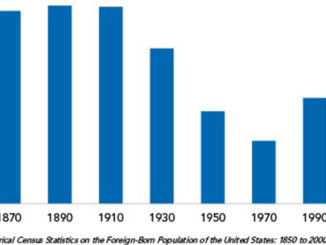Immigrants are 13% of the U.S. population, but they make up nearly 20% of the owners of small businesses.
By John Dearie And Courtney Geduldig
Congress may be on recess, but top Republicans are signaling that 2014 could be crucial for immigration reform. On Dec. 16, Rep. Paul Ryan (R., Wis.) said in a radio interview that the U.S. immigration system is “broken” and “indefensible” and that he will support reform as long as it “maintains Republican, conservative principles.” Speaker of the House John Boehner seems to agree: The Ohio Republican recently hired a longtime immigration advocate as an adviser, after stating in November that reform is “absolutely not” dead.
We hope so. Of all the reasons to support immigration reform, none is more important than the critical role it would play in helping end America’s jobs crisis. Despite the encouraging news that 203,000 jobs were created in November and the unemployment rate fell to 7%, 11 million Americans remain unemployed while another 7.6 million are working part time involuntarily. November was the 43rd month in a row in which more unemployed Americans left the workforce discouraged than found jobs.
Some oppose immigration reform out of fear that more immigrants will take American jobs and make the jobs crisis worse. Such fears are unfounded. Research has repeatedly shown that more open immigration policies would create more jobs for more Americans.
In part that is because immigrants are more entrepreneurial and innovative than native-born Americans—a fact that shouldn’t shock or offend anyone. To immigrate requires being willing to pick up one’s life and move, often at great personal and financial risk, to a different country, with a different culture and often a different language—a profoundly entrepreneurial act. People willing to do so remain highly innovative once they get here.
Immigrants represent 13% of the U.S. population but account for nearly 20% of small businesses owners. Immigrant-owned small businesses employed nearly five million Americans in 2010 and generated an estimated $776 billion in revenue, according to a June 2012 study from the Fiscal Policy Institute. The Partnership for a New American Economy, a bipartisan group of more than 500 business leaders and mayors, has found that more than 40% of Fortune500 companies were founded by immigrants or a child of immigrants.
Immigrants also launch half of the nation’s top startups, and research by the Kauffman Foundation has established that startups account for virtually all net new job creation. A study by the National Foundation for American Policy found that of the top 50 venture capital-backed companies in the U.S. last year, 23 have at least one foreign-born founder, while 37 have at least one immigrant in a major management position. Intel, Google, Yahoo and eBayare a few of the American companies started by the foreign-born.
Immigrants were involved in more than 75% of the nearly 1,500 patents awarded at the nation’s top 10 research universities in 2011—and nearly all the patents were in science, technology, engineering and mathematics, according to the Partnership for a New American Economy. Foreign-born innovators contributed to 87% of the patents filed in semiconductor-device manufacturing, 84% in information technology, 83% in pulse or digital communications, and 79% in pharmaceutical drugs or drug compounds.
The net result of immigrants’ innovation and entrepreneurship is job creation. This effect is most pronounced for immigrants with advanced degrees from U.S. universities working in science and technology fields. According to a study by the American Enterprise Institute, between 2000 and 2007 each group of 100 foreign-born workers with such backgrounds was associated with 262 additional American jobs.
During the summer of 2011, we conducted roundtables with entrepreneurs in 12 U.S. cities, asking about obstacles to business formation and growth. In every city, frustrated entrepreneurs cited policy barriers to attracting and retaining the world’s best talent as one of the principal obstacles.
Rob Lilleness, president and chief executive of software developer Medio Systems in Seattle, Wash., explained how immigration restrictions often force new companies to outsource jobs to people abroad with math and science backgrounds. “We have to look at India, or Argentina, or Vietnam, or China because there’s not enough H-1B visas,” he said.
“Had I known when I came here what I’d have to do to start my business here, I don’t know that I would do it again,” said Bettina Hein, the German-born founder of Pixability, a Web-based YouTube marketing software company. “Right now, my visa is running out and they might not renew it. What would I do with the company? I have enough investors now that I could have them all call their congressman, I guess. But why do people have to resort to such desperate measures just to stay here?”
Tim Rowe, founder of the Cambridge Innovation Center, a shared office space facility for startups and venture-capital firms in Cambridge, Mass., told us that “our immigration policy is built around the notion that we have to protect American jobs. But we’ve got it backward. We’re threatening the creation of new jobs by preventing these incredibly talented entrepreneurs from overseas from coming here and building their businesses here.”
There is already evidence that this is happening. A 2009 survey of more than 1,200 foreign students attending American colleges and universities found that only 6% of Indian students, 10% of Chinese students, and 15% of European students hoped to stay in the U.S. permanently. The vast majority—85% of Indian and Chinese students, and 72% of European students—cited concerns regarding their ability to obtain work visas. More than 70% of the students polled said they planned to start a new business.
As Steve Case, Michael Bloomberg and others have pointed out, the rest of the world—from Canada to New Zealand, from China to Chile—has revamped immigration policies to recruit the world’s best talent. Initial indications are that such efforts are working. Since its inception in 2010, the Start-Up Chile program, through which the Chilean government provides direct financing to entrepreneurs, has funded 663 startups, many founded by foreign-born entrepreneurs.
Will the U.S. prosper in the 21st-century economy? Only if our immigration policies are designed to compete.
Mr. Dearie, executive vice president at the Financial Services Forum, and Ms. Geduldig, vice president of global regulatory affairs at Standard & Poor’s, are co-authors of “Where the Jobs Are: Entrepreneurship and the Soul of the American Economy” ( Wiley, 2013).



